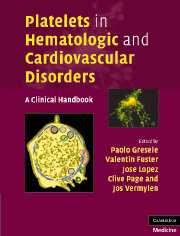Book contents
- Frontmatter
- Contents
- List of contributors
- Preface
- Glossary
- 1 The structure and production of blood platelets
- 2 Platelet immunology: structure, functions, and polymorphisms of membrane glycoproteins
- 3 Mechanisms of platelet activation
- 4 Platelet priming
- 5 Platelets and coagulation
- 6 Vessel wall-derived substances affecting platelets
- 7 Platelet–leukocyte–endothelium cross talk
- 8 Laboratory investigation of platelets
- 9 Clinical approach to the bleeding patient
- 10 Thrombocytopenia
- 11 Reactive and clonal thrombocytosis
- 12 Congenital disorders of platelet function
- 13 Acquired disorders of platelet function
- 14 Platelet transfusion therapy
- 15 Clinical approach to the patient with thrombosis
- 16 Pathophysiology of arterial thrombosis
- 17 Platelets and atherosclerosis
- 18 Platelets in other thrombotic conditions
- 19 Platelets in respiratory disorders and inflammatory conditions
- 20 Platelet pharmacology
- 21 Antiplatelet therapy versus other antithrombotic strategies
- 22 Laboratory monitoring of antiplatelet therapy
- 23 Antiplatelet therapies in cardiology
- 24 Antithrombotic therapy in cerebrovascular disease
- 25 Antiplatelet treatment in peripheral arterial disease
- 26 Antiplatelet treatment of venous thromboembolism
- Index
19 - Platelets in respiratory disorders and inflammatory conditions
Published online by Cambridge University Press: 15 October 2009
- Frontmatter
- Contents
- List of contributors
- Preface
- Glossary
- 1 The structure and production of blood platelets
- 2 Platelet immunology: structure, functions, and polymorphisms of membrane glycoproteins
- 3 Mechanisms of platelet activation
- 4 Platelet priming
- 5 Platelets and coagulation
- 6 Vessel wall-derived substances affecting platelets
- 7 Platelet–leukocyte–endothelium cross talk
- 8 Laboratory investigation of platelets
- 9 Clinical approach to the bleeding patient
- 10 Thrombocytopenia
- 11 Reactive and clonal thrombocytosis
- 12 Congenital disorders of platelet function
- 13 Acquired disorders of platelet function
- 14 Platelet transfusion therapy
- 15 Clinical approach to the patient with thrombosis
- 16 Pathophysiology of arterial thrombosis
- 17 Platelets and atherosclerosis
- 18 Platelets in other thrombotic conditions
- 19 Platelets in respiratory disorders and inflammatory conditions
- 20 Platelet pharmacology
- 21 Antiplatelet therapy versus other antithrombotic strategies
- 22 Laboratory monitoring of antiplatelet therapy
- 23 Antiplatelet therapies in cardiology
- 24 Antithrombotic therapy in cerebrovascular disease
- 25 Antiplatelet treatment in peripheral arterial disease
- 26 Antiplatelet treatment of venous thromboembolism
- Index
Summary
INTRODUCTION
Over the last years increasing attention has been directed to the previously unrecognized role of platelets in inflammatory processes, including atherogenesis, ischemia–reperfusion injury, and sepsis.
Several studies have revealed alterations of platelets from patients with inflammatory diseases, and these alterations have been dissociated from the well-characterized involvement of platelets in thrombosis and hemostasis. The mechanisms by which platelets participate in inflammation are still being discovered, but there is now wider acceptance that platelets act as innate inflammatory cells in the immune response with roles as sentinel cells exerting surveillance and responding to microbial invasion, tissue damage, and antigen challenge. Platelet activation by proinflammatory mediators, functional interactions with other cells involved in inflammation, and the evidence that platelets undergo chemotaxis through inflamed tissue are testimony that platelets directly participate in inflammation. Platelets appear to be involved in the pathogenesis of diverse inflammatory diseases in various body compartments, encompassing parasitic infections, allergic inflammation (including asthma and rhinitis), chronic obstructive pulmonary disease (COPD), cystic fibrosis, rheumatoid arthritis (RA), allergic dermatologic disorders, and inflammatory bowel diseases. Platelets also play a role as inflammatory cells in atherogenesis, a topic discussed in Chapter. The aim of this chapter is to give an overview on the role of platelets in inflammation, starting from the structural, biochemical, and functional properties that characterize platelets as inflammatory cells, and then to discuss their participation in some inflammatory disorders with evidence derived from experimental studies in animals and from observations in patients.
- Type
- Chapter
- Information
- Platelets in Hematologic and Cardiovascular DisordersA Clinical Handbook, pp. 323 - 340Publisher: Cambridge University PressPrint publication year: 2007



